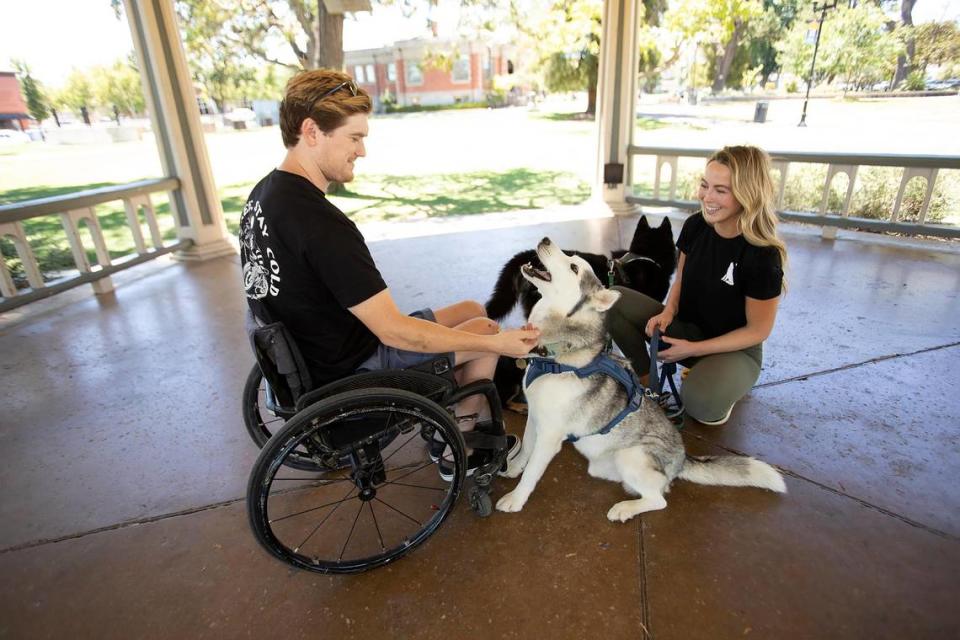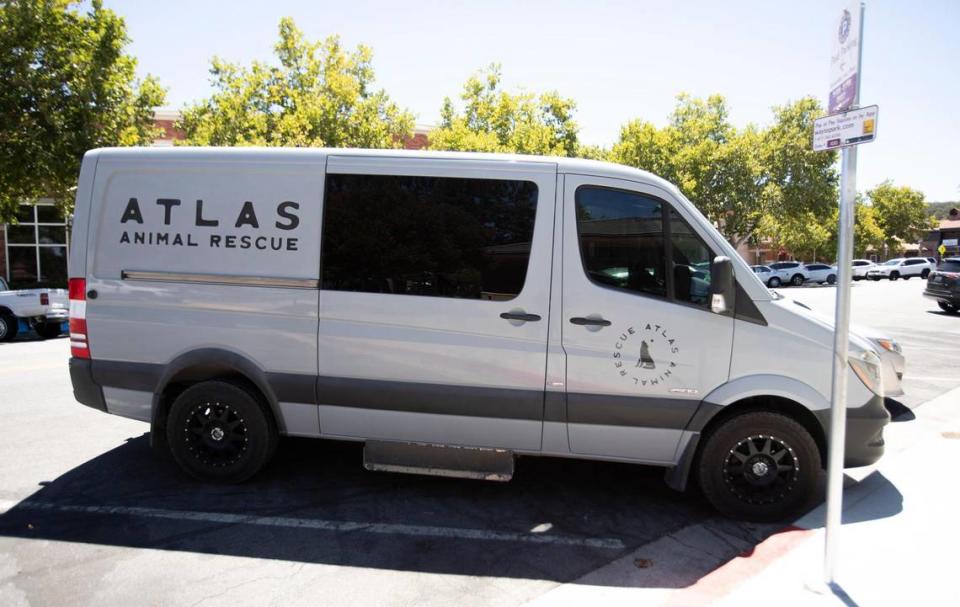Paso Robles animal rescue finds homes for dogs from around the world — but it needs help
When Emily Everett-Nelson began to care for her husband Jessy Nelson after he was in a motorcycle accident in 2016, she didn’t expect to find a new calling in life.
But then she started volunteering at local shelters near her Southern California home as a way to seek respite from her new role as a caregiver — and she and her husband began to discover a passion for giving rescued dogs a better life.
“We both dealt with his accident in different ways,” Everett-Nelson told The Tribune in an interview July 18. “I think for him, it really calmed him down helping something else that had a need.“
In 2020, Everett-Nelson established an animal rescue of her own — Atlas Animal Rescue, a nonprofit organization that matches rescued dogs from California and far-flung places like China, Dubai and Romania with loving owners all across the United States.
The mission of the Paso Robles-based organization is to rehabilitate and re-home dogs rescued from precarious conditions — from dogs that were on euthanasia lists in Southern California, to dogs that would have otherwise been part of the meat trade in China.
“We’re a really small animal rescue with big dreams,” Everett-Nelson said. “Every dog that comes through us has such a unique story and such a unique past. And I think it’s pretty beautiful to have so many dogs that we foster from different countries.”

So far, Atlas Animal Rescue has been able to rescue more than 75 dogs, Everett-Nelson said.
This growing organization also received a lot of attention from animal lovers around the world after being featured on the the popular animal social media account, The Dodo.
These rescues have happened all without a shelter property. So far, the rescue has relied completely on foster families and donations, she said, although their goal is to eventually build a shelter, since having one will help Atlas rehabilitate even more dogs.
“It’s hard to really branch out without having that like physical place to take all these dogs,” Everett-Nelson said. “Fosters are just harder and harder to find at this time. Everyone’s so busy, and everything’s constantly changing. It’s just been a little bit more difficult finding those types of volunteers.”
Paso Robles-based rescue saves dogs from around the world
Everett-Nelson said one of the attributes that sets Atlas apart from other Central Coast rescues is that the nonprofit works with both local and international dogs.
Atlas Animal Rescue has a partnership with Harbin Slaughterhouse Survivors Animal Rescue, an animal shelter based in Harbin, China that rehabilitates dogs that would otherwise be part of the meat trade in China. After a period of rehabilitation, Slaughterhouse Survivors finds the dogs new homes overseas, Everett-Nelson said.
Through this partnership, Everett-Nelson said Atlas rehabilitated and re-homed more than 30 dogs that were flown to the United States from China.
Just when the partnership started to gain momentum, a government restriction grounded the transfer of animals between the two countries to a halt.
In July 2021, the Centers for Disease Control and Prevention (CDC) temporarily banned the import of dogs from countries deemed a high-risk for rabies into the United States. China is on the list. The restriction was extended through January 2023 this June.
“Right when I launched (in September 2020) my partners in China were like, ‘OK, this is our time. We can get as many dogs out of here, because we don’t know if the borders are gonna open again,’” Everett-Nelson said. “It was madness. It was stressful in the moment but after looking back on it and seeing all of these dogs in the most amazing homes ... it’s just beautiful to see them all living their best life after such a crazy launch.”
Despite the slow-down of dogs imported from China, Atlas switched gears to work with dogs rescued from other countries, Everett-Nelson said.
Atlas recently rescued a handful of dogs from Ukraine and Dubai, and are hoping to re-home dogs from South Korea as well.
Animal rescue pledges to save local dogs for every international dog
Although Atlas has a global reach when it comes to rescuing pups, the majority of the dogs the rescue saved are from California. Atlas Animal Rescue has a two-for-one pledge, meaning for every international dog they bring in, they rescue two local dogs, Everett-Nelson said.
The local dogs mostly come from overcrowded Southern California shelters like the county-run Devore Animal Shelter in San Bernardino.
Everett-Nelson said she generally works with overpopulated dog shelters from communities with a lot of strays and surrenders. Dogs rescued from crowded shelters that would otherwise have been euthanized are moved to places without as many stray dogs where it’s easier to find homes for them, like in San Luis Obispo County.

“(Some dog shelters in Southern California) just don’t have the finances and they don’t have that ability to get all these dogs homes down there,” Everett-Nelson said. “So we usually will drive down there, pick some dogs that are going to be euthanized, get them up here and give them rehabilitation.”
Whether they’re local or international, there’s still a variety of dogs Atlas helps — from abandoned puppies to dogs with special needs.
“We’ve had everything at this point,” Everett-Nelson said. “We’ve had some severe medical issue dogs, paralyzed dogs, three-legged dogs ... it’s kind of a spectrum.”
The shelter typically has about 10 dogs in foster homes, she said.
The rescue makes sure every dog is up-to-date on their vaccines and rehabilitated behaviorally and medically before being adopted, Everett-Nelson said.
Depending on the dog, this process can take a few weeks to a few months.
“We don’t ever want to rush it, we want to make sure they get that proper rehabilitation,” she said. “We want to make sure we take time with each individual dog and really use every tool they need to find that forever home and to stay in that forever home.”
How to help Atlas Animal Rescue
The rescue center has three dogs up for adoption right now— Everest, an “easy going” Siberian husky; Meryl, an “extremely loyal” small 4-year-old, and Mike, an “extremely soft” blind 4-year-old who “loves affection and attention,” according to the adoption website.
Anyone who wants to adopt them can apply on the rescue’s website. To help Atlas find a perfect match for the furry friends, potential adopters will be asked about their living situation and work life.
Another way to support rescue dogs is through fostering. Since the rescue does not have a brick-and-mortar shelter yet, foster volunteers are especially important to fulfilling the rescue’s mission, Everett-Nelson said.
Everett-Nelson and her husband foster some of the dogs that require more handling experience, such as dogs with more behavioral issues, but temporary homes are still needed for some of the other rescued dogs.
“Even if someone’s available to just foster a dog for even a weekend to a week, or whatever it take be for us to find the dog a home, that’s huge,” Everett-Nelson said.

Those interested can apply to foster dogs for Atlas on the rescue’s website.
Meanwhile, donations help pay for the dogs’ rehabilitation, travel and medical expenses in foster homes.
“That’s what keeps us going,” Everett-Nelson said. “We’re completely donation based ... so every donation counts. Every dollar that’s donated goes directly to our dogs.”
Donations will also help the rescue eventually build a local shelter, Everett-Nelson said.
“In the next year or two, we’re really trying to raise funds for (the shelter),” Everett-Nelson said. “And get some property locally where people can come visit and volunteer and be able to work with our dogs and meet our dogs since they are coming not only from local places, but places across the world.”
Those interested in donating can do so through donorbox.org/d-o-n-a-t-e.

